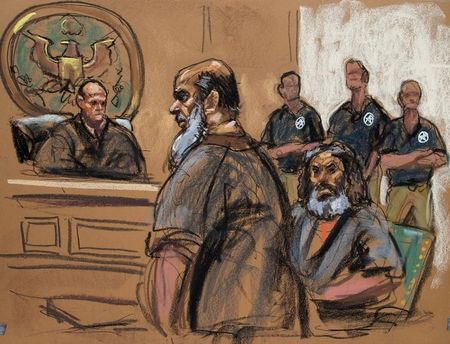By Joseph Ax and Nate Raymond
NEW YORK (Reuters) - An Egyptian man pleaded guilty in New York on Friday to charges stemming from the deadly 1998 bombings of U.S. embassies in Kenya and Tanzania that killed 224 people.
Wiping tears from his eyes and frequently shaking his head, Adel Abdul Bary, 54, pleaded guilty to three counts, including threatening to kill, injure or destroy property by means of an explosive and conspiring to murder U.S. citizens abroad.
However, U.S. District Judge Lewis Kaplan did not immediately accept the plea agreement, saying he had concerns that Bary had previously faced hundreds of charges, some of which carried a mandatory life sentence.
Under the plea deal, Bary faces a maximum sentence of 25 years in prison. If he is given credit for more than a decade he spent in custody in the United Kingdom while fighting extradition, his sentence would be significantly shorter, Kaplan said.
"You can well appreciate why I have questions in my mind," Kaplan said.
The judge gave the government and Bary's lawyers one week to submit letters explaining why he should accept the deal. If he were to reject it, Bary would be permitted to withdraw his guilty plea and would proceed to trial.
Assistant U.S. Attorney Sean Buckley told Kaplan that Bary was not alleged to have engaged in any overt acts leading to the murders themselves. Instead, Bary was largely accused of disseminating claims of responsibility while serving as a conduit between media outlets and senior al Qaeda figures, including the group's deceased leader Osama bin Laden and his successor, Ayman al-Zawahiri.
Buckley said prosecutors from the office of Manhattan U.S. Attorney Preet Bharara felt the charges "were appropriate with regard to this defendant and the role he played in a much larger conspiracy."
Bary's guilty plea came less than two months before he was set to face trial in New York alongside two co-defendants, Libyan Abu Anas al-Liby and Saudi Khalid al-Fawwaz, both of whom have pleaded not guilty.
Al-Liby, an alleged senior al Qaeda member, was seized by U.S. forces in Libya in October.
Bary was extradited to the United States in 2012 following a protracted legal battle in Britain alongside several other militants, including Fawwaz and the fiery London preacher Abu Hamza al-Masri, who was convicted at trial earlier this year of terrorism-related counts.

Suleiman Abu Ghaith, a son-in-law of bin Laden, was also convicted of terrorism-related charges at trial in March. U.S. prosecutors are seeking a term of life in prison when he is sentenced on Tuesday before Kaplan.
(Reporting by Nate Raymond in New York; Editing by Chizu Nomiyama and Tom Brown)
